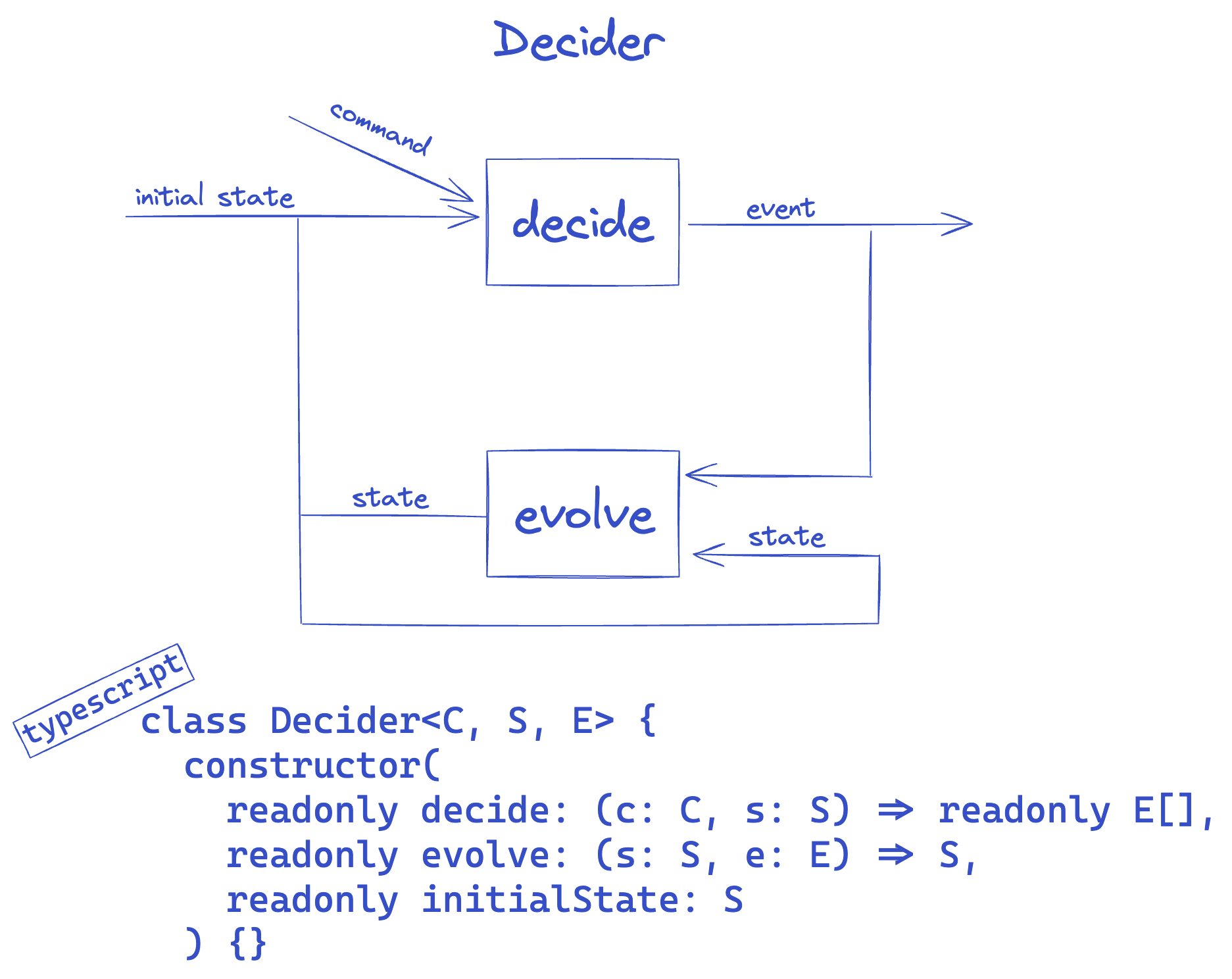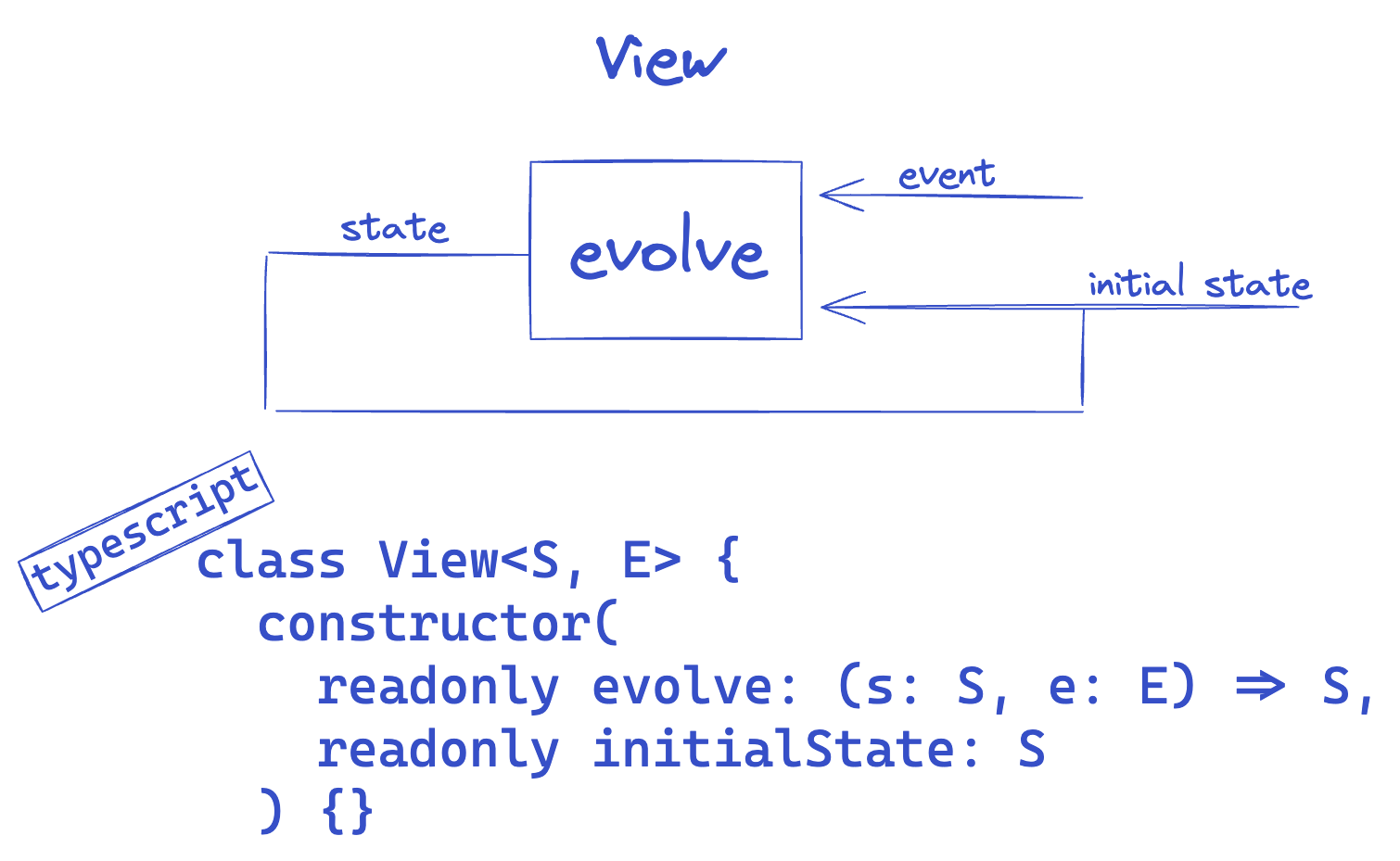Modeling the Behaviour
- algebraic data types form the
structureof our entities (commands, state, and events) - functions/lambda offers the algebra of manipulating the entities in a compositional manner, effectively modeling
the
behavior.
This leads to modularity in design and a clear separation of the entity’s structure and functions/behaviour of the
entity.
Fmodel offers generic and abstract components to specialize in for your specific case/expected behavior:
- Decider
- View
- Saga
Decider
The decider is a data type that represents the main decision-making algorithm.
initialState- A starting point / An initial statedecide(Exhaustive / pattern matching command handler) - A function/lambda that takes command and input state as parameters, and returns/emits the flow of output eventsevolve(Exhaustive / pattern matching event-sourcing handler) - A function/lambda that takes input state and input event as parameters, and returns the output/new state

- Restaurant
- Order
export const restaurantDecider: Decider<
RestaurantCommand,
Restaurant | null,
RestaurantEvent
> = new Decider<RestaurantCommand, Restaurant | null, RestaurantEvent>(
(command, currentState) => {
switch (command.kind) {
case "CreateRestaurantCommand":
return (currentState === null ||
currentState.restaurantId === undefined)
? [
{
version: 1,
decider: "Restaurant",
kind: "RestaurantCreatedEvent",
id: command.id,
name: command.name,
menu: command.menu,
final: false,
},
]
: [
{
version: 1,
decider: "Restaurant",
kind: "RestaurantNotCreatedEvent",
id: command.id,
name: command.name,
menu: command.menu,
reason: "Restaurant already exist!",
final: false,
},
];
case "ChangeRestaurantMenuCommand":
return (currentState !== null &&
currentState.restaurantId === command.id)
? [
{
version: 1,
decider: "Restaurant",
kind: "RestaurantMenuChangedEvent",
id: currentState.restaurantId,
menu: command.menu,
final: false,
},
]
: [
{
version: 1,
decider: "Restaurant",
kind: "RestaurantMenuNotChangedEvent",
id: command.id,
menu: command.menu,
reason: "Restaurant does not exist!",
final: false,
},
];
case "PlaceOrderCommand":
return (currentState !== null &&
currentState.restaurantId === command.id)
? [
{
version: 1,
decider: "Restaurant",
kind: "RestaurantOrderPlacedEvent",
id: command.id,
orderId: command.orderId,
menuItems: command.menuItems,
final: false,
},
]
: [
{
version: 1,
decider: "Restaurant",
kind: "RestaurantOrderNotPlacedEvent",
id: command.id,
orderId: command.orderId,
menuItems: command.menuItems,
reason: "Restaurant does not exist!",
final: false,
},
];
default: {
// Exhaustive matching of the command type
const _: never = command;
return [];
}
}
},
(currentState, event) => {
switch (event.kind) {
case "RestaurantCreatedEvent":
return { restaurantId: event.id, name: event.name, menu: event.menu };
case "RestaurantNotCreatedEvent":
return currentState;
case "RestaurantMenuChangedEvent":
return currentState !== null
? {
restaurantId: currentState.restaurantId,
name: currentState.name,
menu: event.menu,
}
: currentState;
case "RestaurantMenuNotChangedEvent":
return currentState;
case "RestaurantOrderPlacedEvent":
return currentState;
case "RestaurantOrderNotPlacedEvent":
return currentState;
default: {
const _: never = event;
return currentState;
}
}
},
null,
);
export const orderDecider: Decider<OrderCommand, Order | null, OrderEvent> =
new Decider<OrderCommand, Order | null, OrderEvent>(
(command, currentState) => {
switch (command.kind) {
case "CreateOrderCommand":
return (currentState === null || currentState.orderId === undefined)
? [
{
version: 1,
decider: "Order",
kind: "OrderCreatedEvent",
id: command.id,
restaurantId: command.restaurantId,
menuItems: command.menuItems,
final: false,
},
]
: [
{
version: 1,
decider: "Order",
kind: "OrderNotCreatedEvent",
id: command.id,
restaurantId: command.restaurantId,
menuItems: command.menuItems,
final: false,
reason: "Order already exist!",
},
];
case "MarkOrderAsPreparedCommand":
return (currentState !== null && currentState.orderId === command.id)
? [
{
version: 1,
decider: "Order",
kind: "OrderPreparedEvent",
id: currentState.orderId,
final: false,
},
]
: [
{
version: 1,
decider: "Order",
kind: "OrderNotPreparedEvent",
id: command.id,
reason: "Order does not exist!",
final: false,
},
];
default: {
// Exhaustive matching of the command type
const _: never = command;
return [];
}
}
},
(currentState, event) => {
switch (event.kind) {
case "OrderCreatedEvent":
return {
orderId: event.id,
restaurantId: event.restaurantId,
menuItems: event.menuItems,
status: "CREATED",
};
case "OrderNotCreatedEvent":
return currentState;
case "OrderPreparedEvent":
return currentState !== null
? {
orderId: currentState.orderId,
restaurantId: currentState.restaurantId,
menuItems: currentState.menuItems,
status: "PREPARED",
}
: currentState;
case "OrderNotPreparedEvent":
return currentState;
default: {
// Exhaustive matching of the event type
const _: never = event;
return currentState;
}
}
},
null,
);
View
The view is a data type that represents the event handling algorithm responsible for translating the events into the denormalized state, which is adequate for querying.
initialState- A starting point / An initial stateevolve(Exhaustive / pattern matching event handler) - A function/lambda that takes input state and input event as parameters, and returns the output/new state

- Restaurant
- Order
export const restaurantView: View<RestaurantView | null, RestaurantEvent> =
new View<RestaurantView | null, RestaurantEvent>(
(currentState, event) => {
switch (event.kind) {
case "RestaurantCreatedEvent":
return { restaurantId: event.id, name: event.name, menu: event.menu };
case "RestaurantNotCreatedEvent":
return currentState;
case "RestaurantMenuChangedEvent":
return currentState !== null
? {
restaurantId: currentState.restaurantId,
name: currentState.name,
menu: event.menu,
}
: currentState;
case "RestaurantMenuNotChangedEvent":
return currentState;
case "RestaurantOrderPlacedEvent":
return currentState;
case "RestaurantOrderNotPlacedEvent":
return currentState;
default: {
// Exhaustive matching of the event type
const _: never = event;
return currentState;
}
}
},
null,
);
export const orderView: View<OrderView | null, OrderEvent> = new View<
OrderView | null,
OrderEvent
>(
(currentState, event) => {
switch (event.kind) {
case "OrderCreatedEvent":
return {
orderId: event.id,
restaurantId: event.restaurantId,
menuItems: event.menuItems,
status: "CREATED",
};
case "OrderNotCreatedEvent":
return currentState;
case "OrderPreparedEvent":
return currentState !== null
? {
orderId: currentState.orderId,
restaurantId: currentState.restaurantId,
menuItems: currentState.menuItems,
status: "PREPARED",
}
: currentState;
case "OrderNotPreparedEvent":
return currentState;
default: {
// Exhaustive matching of the event type
const _: never = event;
return currentState;
}
}
},
null,
);
Saga
Saga is a data type that represents the central point of control, deciding what to execute next. It is responsible for mapping different events from deciders into action results that the Saga then can use to calculate the subsequent actions to be mapped to the command of other deciders.
In the context of smart endpoints and dumb pipes, deciders would be smart endpoints, and saga would be a dumb pipe.
react- A function/lambda that takes input action-result/event, and returns the flow of actions/commands that should be published.

- Restaurant
- Order
export const restaurantSaga: Saga<OrderEvent, RestaurantCommand> = new Saga(
(event) => {
switch (event.kind) {
case "OrderPreparedEvent":
case "OrderNotPreparedEvent":
case "OrderCreatedEvent":
case "OrderNotCreatedEvent":
return [];
default: {
// Exhaustive matching of the Action Result/Event type
const _: never = event;
return [];
}
}
},
);
export const orderSaga: Saga<RestaurantEvent, OrderCommand> = new Saga<
RestaurantEvent,
OrderCommand
>(
(event) => {
switch (event.kind) {
case "RestaurantOrderPlacedEvent":
return [
{
decider: "Order",
kind: "CreateOrderCommand",
id: event.orderId,
restaurantId: event.id,
menuItems: event.menuItems,
},
];
case "RestaurantCreatedEvent":
case "RestaurantNotCreatedEvent":
case "RestaurantMenuChangedEvent":
case "RestaurantMenuNotChangedEvent":
case "RestaurantOrderNotPlacedEvent":
return [];
default: {
// Exhaustive matching of the Action Result/Event type
const _: never = event;
return [];
}
}
},
);
Totality
A function is total if it is defined for all of its possible inputs.
By having algebraic data types modeling the Sum/OR relationship with union type, it's possible to verify that the switch statement covers all cases.
The never type is assignable to every type; however, no type is assignable to never (except never itself). This means you can use narrowing and rely on never turning up to do exhaustive checking in a switch statement.
The compiler/transpiler will yell at you if you add a new command/event into the model/project (switch statement goes red), and
you will have to fix it immediately.
It will positively influence the function (decide, evolve, react) totality giving more guarantees about code
correctness.
The essence of functional programming lies in the power of pure functions. Add static types to the mix, and you have algebraic abstractions—functions operating on types and honoring certain laws. Make the functions generic on types, and you have parametricity. The function becomes polymorphic, which implies more reusability, and if you’re disciplined enough not to leak any implementation details by sneaking in specialized types (or unmanaged hazards such as exceptions), you get free theorems.